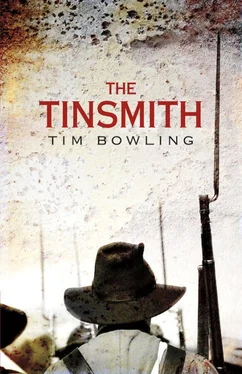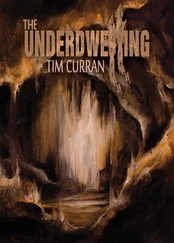Anson looked for Dare but could not find him. He shouted out to the one Indian who had taken a brief pause in his work. “Where’s your boss?” But the Indian merely pointed to the river and resumed his labours.
When Anson followed the gesture, he saw nothing but a bright sheen of empty water stretching away to the base of distant blue mountains. No doubt the fishing skiffs were out there in the glitter, and Dare with them, but the day had closed itself with light.
Again, he had to be content with waiting and watching. He found a convenient position against a piling head and settled in for a while. He tried to count the salmon as they were tossed on the wharf, but they came too fast and he grew dizzied with the effort. Then he concentrated on the gulls. Somehow their frenzied attendance appealed to his sympathies—Anson knew how they felt, so close to their goal yet maddeningly kept from it. Their screeching seemed to come up out of his own body. And when the sound stopped, the silence jolted him first. Then he heard them.
Two gunshots. Three. The Indians on the scows and in the skiffs turned to the river in one motion. The sheen on the surface dulled. Anson saw flecks of white sails in the distance, but the sight explained nothing. Even so, he instinctively reached for his medical kit, which he then cursed himself for forgetting. The fact was, he had met Dare only once after the war, only once when the possibility of violence was not palpable on the air they breathed, and this did not feel like that singular peaceful encounter. Indeed, that feeling had not been present during Anson’s whole time at Chilukthan, awaiting Dare’s arrival. What grace had fallen had been entirely separate from Dare.
Seconds after the gunshots’ echoes had died, the gulls resumed their raucous attack on the steadily increasing supply of fish guts, the sun dragged its own viscera down the sky, and the Indians folded their torsos into the pitching. Steam poured out of every chink in the planks of the cannery: it resembled the rim of an active volcano around which savages were carrying out an ancient ritual. And the blood that leaked from it was somehow human, the result of human violence upon the body of a human past. The blood of Thermopylae and Troy as well as Bull Run and Antietam. As the blood mixed with the descending dusk and approached over the darkening river, Anson rose to meet the violence he had been tasting for weeks, the violence he did not want to believe in because, somehow, the blade of the knife was pressed against his own throat.
July 1881, the mouth of the Fraser River
Suddenly Dare sensed the skiffs closing around him. The dark was fast. He couldn’t see the Englishman clearly, just the faintest outline of his shape. The slap of fish on wood, a sharp, wet sound, like a lash on bloodied skin, replaced the Indian’s chanting. Dare raised his gun to his shoulder. Right beside him he could hear the Indians breathing as they untangled the catch.
The shot startled him. He ducked, stayed low. Waited for the pain. A second shot started in the echo of the first. He heard a cry from the closest skiff, only a dozen feet away, raised his gun high and pulled the trigger. Sound inside sound, a lit torch tearing through the dark. He saw, very close, the Englishman’s face. The white shock there. Then silence. The lapping of the current. The cats in the moonlight at the shining pools. After Daney had cursed him, when he stood in the middle between the shack and the house and didn’t know where he belonged.
The other skiffs pulled away. Oars splashed violently. Someone shouted that Thomas Lansdowne had been murdered.
Dare’s whole body tightened. His hands twitched, and so he put down his gun and reached for the oars to pull himself forward. It was the one thing he had always done. Gone forward. It didn’t seem he should do anything else, even if he could. There was nothing behind of any use. But what if going back was itself a way to go forward? He paused, took the small leather pouch that hung off a string inside his sodden cotton shirt, and rubbed it slowly, repeatedly. Was it time? For twenty years he’d been moving, convinced he did so only to make his living. But he was tired; the past was catching him. And what if it did? A splash of oars broke around him. The other skiffs pulled away in the dark. He bent into the strokes until he came alongside Lansdowne’s skiff, thinking he would take the fallen and bleeding Englishman to the slough. The doctor would be there. That much he could count on. Yes. The doctor would be there. Dare clambered into Lansdowne’s skiff and positioned himself at the oars.
He pulled harder now, found a rhythm to calm himself. And yet he still heard the taunts as he headed for the slough; they seemed to rise up out of the river and surround him.
The Englishman moaned from the gunwale where Dare had adjusted his body. For a moment, Dare froze, the air on his nape warm as the mulatto’s breath. He knew his bullet had not struck the man; he knew he had aimed at the sky. So why did he feel the awful, descending chill of a haunting? What ghost had come for him out of the slime and salmon blood? He shook the chill off. On the horizon, a small moon hung faint and dirty, the dark pressing around it. Marbled pig’s flesh. The overseer’s cheek. Only the black smears on the moon were wrong; they belonged to another face. Dare drew a deep, ratcheting breath, then pulled to meet his image, the boy the overseer hadn’t killed, the boy who escaped the rice fields and ran, starved and terrified, with only the stars and his hatred to guide him. But the man who had returned to Antietam could not keep what was behind from coming up with each lifting of the dark water.
September 1862, near Antietam Creek
The letters were gone. He had scraped them off his flesh with a dull blade not long after joining up with the great backwash of people following the Union army. But he could still feel them under the larger, messier scar he’d made, even without raising a hand to his cheek. Sometimes they burned even more than when he’d hidden in the master’s house after the great battle and waited for Orlett to return. Those hours had been among his worst. Each small sound fired his blood; he was so close to the revenge that had kept him awake nights, so close to wiping out the doglike grin and Caleb’s red back and the quick splashes beside the ferry. But as time passed and the overseer didn’t return to the master’s house, the pressure became too much. He had to act. He had to go out again and search. Sometimes it seemed that every moment of the overseer’s continuing life subtracted a moment from his own. It was harder than the drive south or the long year toiling under the whip in the rice fields because then he knew he had obstacles to overcome. Now, this close, the delay felt like a failure that might prove permanent. Besides, he needed to contribute to the Union cause. Daney had been right about the war, and he was going to do all he could to make sure she’d be right about the freedom too. Waiting in the master’s house to exact his private vengeance felt almost selfish. But he decided there was no reason that he couldn’t do both. After all, just that morning he had removed the uniform from a dead soldier; so it was only right that he should continue the work of that soldier’s army.
The war had surrounded the farm, washed up against it like a great bloody tide that, receding, had left a beach of rotting debris. Within a hundred yards of the house, the bodies lay thick, fallen almost in perfect rows. Beyond, for a half-mile north and south along the dusty turnpike, solitary figures and small groups of three and four men moved among the dead and wounded, slowly as wasps over rotted fruit. Farther to the north, banked against the woods like the ashes of a fire, the bulk of the army rested.
Читать дальше












